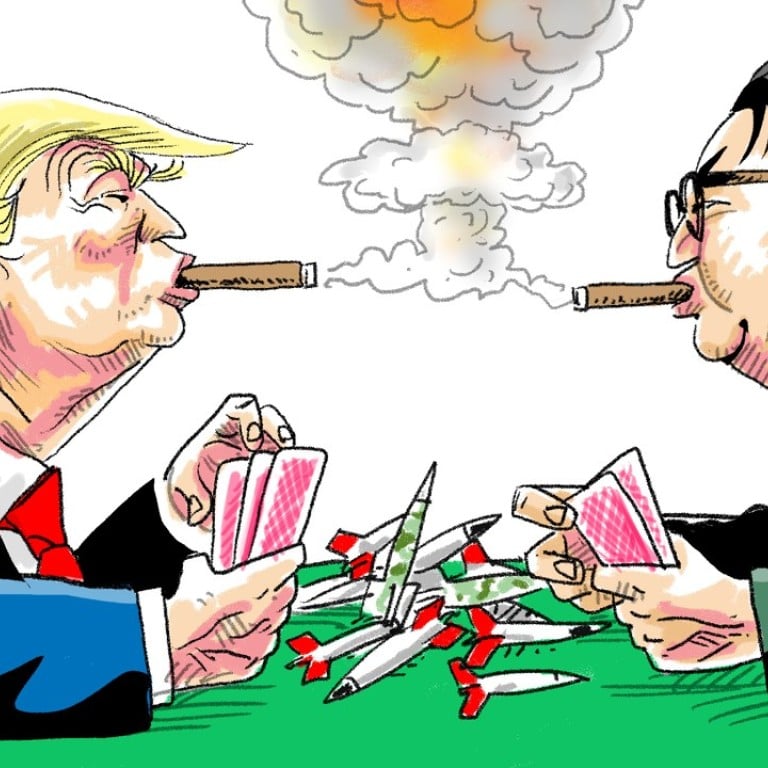
Why Trump should make peace with the idea of a nuclear North Korea and focus on deterrence instead
Louis René Beres says it’s time for the US to accept that North Korea cannot and will not give up its nuclear weapons and to work out how to move on from here
Trump should focus on concessions that his counterpart in Pyongyang might be expected to consider. To expect that Kim would surrender his most meaningful source of national and international power is foolhardy.
Watch: Trump’s ‘art of the deal’ on North Korea summit
If the US calculates that its North Korean counterpart is not fully rational, incentives to undertake a military pre-emption could become more compelling
Prospective diplomatic contests should be less about curtailing specific North Korean weapons systems than about diminishing overall enemy threats from Pyongyang. Predictably, each side, as long as it remains rational, will seek viable forms of “escalation dominance”. Washington and Pyongyang will each strive to control the pace of escalation without endangering its own prospects for national security.
In such high-stakes matters, antecedent judgments of rationality are critical. If the US calculates that its North Korean counterpart is not fully rational, incentives to undertake a military pre-emption could become more compelling in Washington.
US pre-emption against North Korean hard targets, in the context of expected nuclear aggression from Pyongyang, might qualify in legal terms as “anticipatory self-defence”; nonetheless, it could come at too high a cost. What would it mean to be legally correct at the expense of grievously high fatalities or of suffering destructive retaliation – nuclear or conventional?
Creation of a stable nuclear deterrence regime between Washington and Pyongyang is required, one that also accounts for the expectations of Moscow and Beijing. Should this deterrence regime ever be allowed to falter or fail – and should Trump decide to undertake military action against North Korea – the general contours of Kim's response are easy to anticipate. Pyongyang could choose to strike the US homeland, US military forces in the region, targets in Guam, Japan or South Korea, or any combination of these.
Kim’s retaliatory blow would be designed so as not to elicit massive US counter-retaliation. Such reasoned conclusion by Kim would depend, inter alia, upon his own adherence to rational decision-making and the unpredictable synergies between Kim's level of rationality and the reciprocally rational calculations of Trump. Such synergies could produce instability more insidious than the sum of their “parts”.
The utter unpredictability of all possible scenarios is the only element of crisis that can be reliably predicted
If Trump decides to launch a non-nuclear defensive first-strike, the North Korean response could be disproportionate. In such a case, the introduction of nuclear weapons into an already-volatile mix cannot be discounted. But if Trump's strike against North Korea were non-nuclear, a rational adversary in Pyongyang might determine that his chosen reprisal should be correspondingly "limited".
If Trump's attack on North Korea were launched against an irrational leadership, the expected response from Kim could still be all-out retaliation. In short, the utter unpredictability of all possible scenarios is the only element of crisis that can be reliably predicted.
Any strategic game between Washington and Pyongyang, even if played by rational adversaries, would demand each player strive for escalation dominance. Amid such perilous rivalry, the prospect of mutual catastrophe could rapidly emerge.
In facing off against each other for escalation dominance, even under the assumptions of bilateral rationality, Trump and Kim must prepare for possible miscalculations, errors in information, unauthorised uses of strategic weapons, mechanical or computer malfunctions, and nuances of cyber-defence and war.
Americans cannot realistically expect such scrupulous preparation.
There is one final reminder for the US president: science cannot assign genuine mathematical probabilities to unique events. A nuclear exchange between North Korea and the US represents such a singular event – one with unforeseeable interactions and synergies. It follows that no one could accurately predict whether such a conflict would be more or less likely.
Should Trump decide to strike North Korea preemptively on the optimistic assumption that his generals have “everything covered”, he must be reminded of Carl von Clausewitz’s warning. Long before military planners could have imagined a nuclear war, the Prussian general cautioned leaders in his classic On War about “the difference between war on paper, and war as it actually is”. Accordingly, nuclear brinkmanship between Washington and Pyongyang would take place in uncharted waters, requiring both leaders to steer a consistently steady course between escalation dominance and national survival.
Nuclear diplomacy is not a casino game or akin to bluffing in property transactions. It is a complex contest of strategy, never one of mere chance.
In any such game where there exist overriding common interests between the players – most notably national survival – choosing the best course of action depends on what Trump can expect from the other side.
Kim will not accept Trump's definition of “denuclearisation”. This suggests that Trump’s most ambitious objective – not merely his diplomatic fallback position – should be to acknowledge North Korea as a nuclear weapons state and accept a stable nuclear deterrence regime between Washington and Pyongyang. Although less satisfying than the fanciful idea of eliminating North Korean nuclear assets, such a security regime remains the best available strategic option for Northeast Asia. Moreover, because world politics is best understood as a system, what happens in the Asia-Pacific region will have serious implications for what could happen elsewhere, especially in South Asia, with nuclear powers Pakistan and India, and in the Middle East.
Louis René Beres was educated at Princeton and is Emeritus Professor of International Law at Purdue. Reprinted with permission from YaleGlobal Online http://yaleglobal.yale.edu
